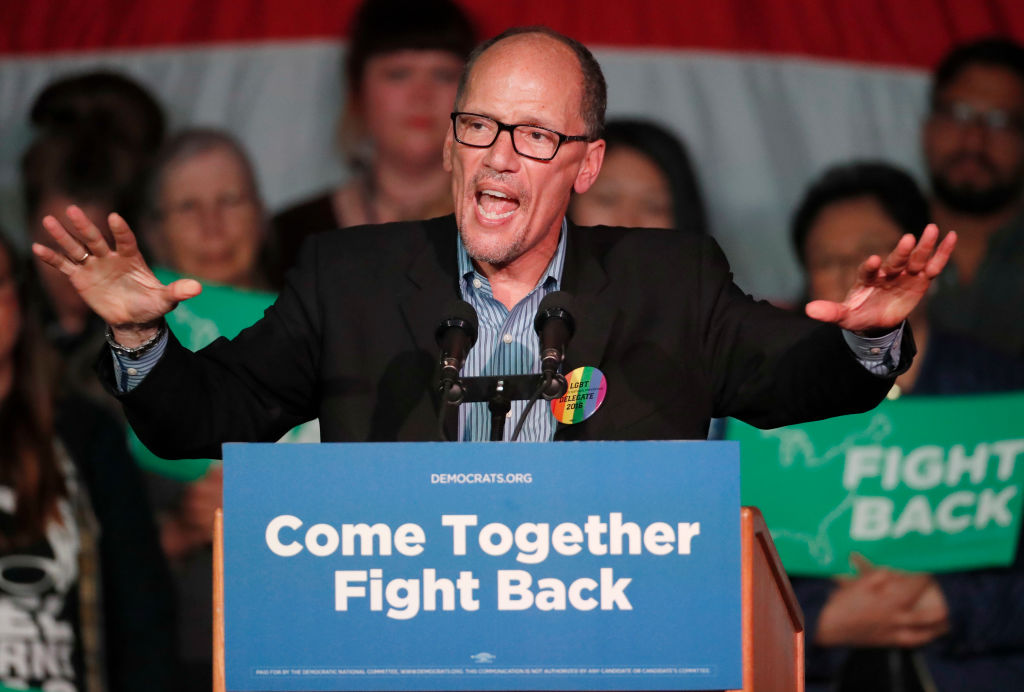Just two months after the Democratic National Committee (DNC) was celebrated by environmentalists for banning donations from fossil fuel companies, it voted 30-2 on Friday to adopt a resolution from Chair Tom Perez that critics said effectively reverses the ban and represents “an absolute failure by the DNC.”
The Huffington Post’s Alexander Kaufman tweeted Friday:
UPDATE: resolution passed in a 30-to-2 vote.
from DNC epic: “After hearing concerns from Labor that this was an attack on workers, this resolution acknowledges
the generous contributions of workers, including those in energy, who organize and donate to Democratic candidates.”
— Alexander Kaufman (@AlexCKaufman) August 10, 2018
As climate reporter Kate Aronoff outlined in a series of tweets, Perez’s resolution “is premised on the party’s support for unions,” but ultimately will enable fossil fuel executives to use their money to try to influence Democrats.
To put a fine point on it: This proposal isn’t to let union members keep donating to the DNC. It’s to let fossil fuel executives keep donating and selling influence among Democrats. Certain unions (incl some building trades) see their interests as aligned with those of executives
— Kate Aronoff (@KateAronoff) August 10, 2018
The unanimously approved original resolution—which requires the DNC to reject “corporate PAC contributions from the fossil fuel industry”—was spearheaded by Christine Pelosi, the daughter of Democratic House Minority Leader Nancy Pelosi and a member of the DNC’s executive committee.
Christine Pelosi tried Friday to pressure the committee to remove the language in Perez’s resolution which undermines the ban on corporate PAC donations, but her proposal was voted down 28-4:
To be clear —> @DNC staff and officers NEVER consulted me on language to reverse my resolution banning corporate fossil fuel PAC money and now said they have to keep the resolution as is because of all the work *we* did. 4 Yes votes; 28 No votes so my motion to ban PAC $ fails.
— (((sfpelosi))) (@sfpelosi) August 10, 2018
While a DNC spokesperson claimed to Kaufman that the resolution is “not a reversal,” adding that “any review of our current donations reflects” the party’s “commitment” to no longer taking donations from the industry, reactions among activists and party supporters ranged from worried to infuriated.
Jerald Lentini, deputy director of the Democratic fundraising group It Starts Today, pointed out in an interview with Kaufman that this resolution may only apply to Democratic campaigns, meaning the new measure may not fully annul the first resolution but would still “repudiate the spirit” of it.
Others were far more critical:
The Left: Everyone who wants a job should get one.
DNC: We agree.
The Left: Great! Let’s do a federal jobs guarantee!
DNC: Nah, let’s just … *checks API-written teleprompter notes* … take money from fossil fuel companies while the world literally burns. https://t.co/iMzd3s4eV1
— Marc Daalder (@marcdaalder) August 10, 2018
And, as 350.org co-founder Bill McKibben noted, “the issue goes beyond the donations,” because Perez’s resolution “also recommits the party to an ‘all of the above’ energy stance, which was taken out of the platform after a lot of hard work in 2016.”
Responding to McKibben, Bold Nebraska founder and Nebraska Democratic Party Chair Jane Fleming Kleeb vowed that “many of us” will fight the resolution at a DNC meeting later this month:
None of this makes sense—@BarackObama took OFF all references to “all of the above” on Whitehorse website. Why in the age of Trump, wildfires, and eminent domain for private gain are we using land gauge and stances of the GOP? Many of us will fight this at @DNC meeting in August.
— Jane Fleming Kleeb (@janekleeb) August 11, 2018
Press freedom is under attack
As Trump cracks down on political speech, independent media is increasingly necessary.
Truthout produces reporting you won’t see in the mainstream: journalism from the frontlines of global conflict, interviews with grassroots movement leaders, high-quality legal analysis and more.
Our work is possible thanks to reader support. Help Truthout catalyze change and social justice — make a tax-deductible monthly or one-time donation today.
